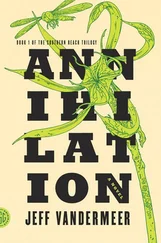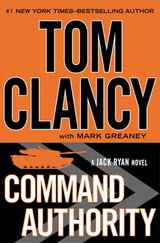“What do you remember about your husband?”
“How is that relevant?”
“Relevant to what?” Pouncing.
No response, so he prompted her again: “What do you remember about your husband?”
“That I had one. Some memories before I went over, like I had about the linguist.” Clever, to tie that in, to try to make it seem part and parcel. A vagueness, not a sharpness.
“Did you know that he came back, like you?” he asked. “That he was disoriented, like you?”
“I’m not disoriented,” she snapped, leaning forward, and Control leaned back. He wasn’t afraid, but for a moment he’d thought he should be. Brain scans had been normal. All measures had been taken to check for anything remotely like an invasive species. Or “an intruder” as Grace put it, still unable to say anything to him remotely like the word alien . If anything, Ghost Bird was healthier now than before she’d left; the toxins present in most people today existed in her and the others at much lower levels than normal.
“I didn’t mean to offend,” he said. And yet she was disoriented, Control knew. No matter what she remembered or didn’t remember, the biologist he’d come to know from the pre-expedition transcripts would not have so quickly shown irritation. Why had he gotten to her?
He picked up the remote control from beside the file, clicked twice. The flat-screen TV on the wall to their left fizzled to life, showing the pixelated, fuzzy image of the biologist standing in the empty lot, almost as still as the pavement or the bricks in the building in front of her. The whole scene was awash in the sickly green of surveillance-camera noir.
“Why that empty lot? Why did we find you there?”
A look of indifference and no answer. He let the video continue to play. The repetition in the background sometimes got to the interviewee. But usually video footage showed a suspect putting down a bag or shoving something into a trash bin.
“First day in Area X,” Control said. “Hiking to base camp. What happened?”
“Nothing much.”
Control had no children, but he imagined that this was more or less what he’d get from a teenager asked about her day at school. Perhaps he would circle back for a moment.
“But you remember the thistles very, very well,” he said.
“I don’t know why you keep talking about thistles.”
“Because what you said about them suggests you remember some of your observations from the expedition.”
A pause, and Control knew the biologist was staring at him. He wanted to return fire, but something warned him against it. Something made him feel that the dream of falling into the depths might take him.
“Why am I a prisoner here?” she asked, and he felt it was safe to meet her gaze again, as if some moment of danger had come and gone.
“You aren’t. This is part of your debriefing.”
“But I can’t leave.”
“Not yet,” he admitted. “But you will.” If only to another facility; it might be another two or three years, if all went well, before they allowed any of the returnees back out in the world. Their legal status was in that gray area often arbitrarily defined by the threat to national security.
“I find that unlikely,” she said.
He decided to try again. “If not thistles, what would be relevant?” he asked. “What should I ask you?”
“Isn’t that your job?”
“What is my job?” Although he knew perfectly well what she meant.
“You’re in charge of the Southern Reach.”
“Do you know what the Southern Reach is?”
“Yesss.” Like a hiss.
“What about the second day at base camp? When did things begin to get strange?” Had they? He had to assume they had.
“I don’t remember.”
Control leaned forward. “I can put you under hypnosis. I have the right to. I can do that.”
“Hypnosis doesn’t work on me,” she said, disgust at his threat clear from her tone.
“How do you know?” A moment of disorientation. Had she given up something she didn’t want to give up, or had she remembered something lost to her before? Did she know the difference?
“I just know.”
“For clarity on that, we could recondition you and then put you under hypnosis.” All of this a bluff, in that it was more complicated logistically. To do so, Control would have to send her to Central, and she’d disappear into that maw forever. He might get to see the reports, but he’d never have direct contact again. Nor did he particularly want to recondition her.
“Do that and I’ll—” She managed to stop herself on the cusp of what sounded like the beginning of the word kill .
Control decided to ignore that. He’d been on the other end of enough threats to know which to take seriously.
“What made you resistant to hypnosis?” he asked.
“Are you resistant to hypnosis?” Defiant.
“Why were you at the empty lot? The other two were found looking for their loved ones.”
No reply.
Maybe enough had been said for now. Maybe this was enough.
Control turned off the television, picked up his file, nodded at her, and walked to the door.
Once there, the door open and letting in what seemed like more shadows than it should, he turned, aware of the assistant director staring at him from down the hall as he looked back at the biologist.
He asked, as he had always planned to, the postscript to an opening act: “What’s the last thing you remember doing in Area X?”
The answer, unexpected, surged up toward him like a kind of attack as the light met the darkness: “Drowning. I was drowning.”
002: ADJUSTMENTS 002: Adjustments 003: Processing 004: Reentry Rites 005: The First Breach 006: Typographical Anomalies 007: Superstition 008: The Terror 009: Evidence 010: Fourth Breach 011: Sixth Breach 012: Sort of Sorting 013: Recommendations 014: Heroic Heroes of the Revolution 015: Seventh Breach 016: Terroirs 017: Perspective 018: Recovery Hauntings 000 020: Second Recovery 021: Repeating 022: Gambit 023: Break Down 00X Afterlife Acknowledgments The Southern Reach Trilogy Book 3: Acceptance About the Author By the Same Author About the Publisher
Just close your eyes and you will remember me,” Control’s father had told him three years ago, in a place not far from where he was now, the dying trying to comfort the living. But when he closed his eyes, everything disappeared except the dream of falling and the accumulated scars from past assignments. Why had the biologist said that? Why had she said she was drowning? It had thrown him, but it had also given him an odd sense of secret sharing between them. As if she had gotten into his head and seen his dream, and now they were bound together. He resented that, did not want to be connected to the people he had to question. He had to glide above. He had to choose when he swooped down, not be brought to earth by the will of another.
When Control opened his eyes, he was standing in the back of the U-shaped building that served as the Southern Reach’s headquarters. The curve lay in the front, a road and parking lot preceding it. Built in a style now decades old, the layered, stacked concrete was a monument or a midden—he couldn’t decide which. The ridges and clefts were baffling; the way the roof leered slightly over the rest made it seem less functional than like performance art or abstract sculpture on a grand and yet numbing scale. Making things worse, the area coveted by the open arms of the U had been made into a courtyard, looking out on a lake ringed by thick old-growth forest. The edges of the lake were singed black, as if at one time set ablaze, and a wretched gnarl of cypress knees waded through the dark, brackish water. The light that suffused the lake had a claustrophobic gray quality, separate and distinct from the blue sky above.
Читать дальше












